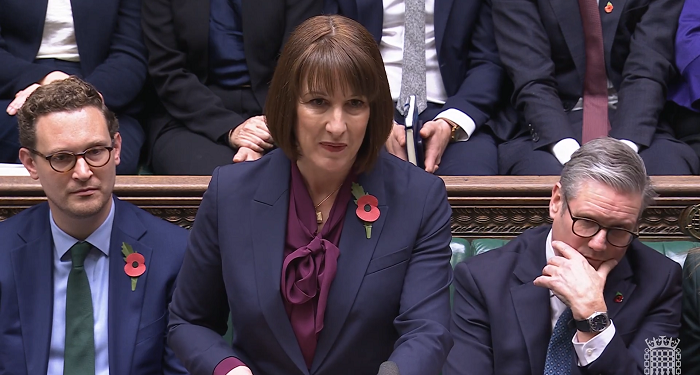The government’s Get Britain Working project will invest £240m to help improve workplace health and keep people in work, including trials of combined public services for those out of work due to ill health.
No exact date was given for when the White Paper outlining further details of the projects and evidence will be published.
Earlier this month, Health & Protection reported that former occupational health tsar Dame Carol Black expected recommendations made by her occupational health taskforce to still emerge in a White Paper.
As part of Get Britain Working, £115m will be invested from next year into a support service to match 100,000 people per year with disabilities and health conditions with suitable work.
Chancellor Rachel Reeves (pictured) announced the funding of around £240m for the series of projects to “support the most at risk” during her Budget speech.
As part of the Budget documentation, the government said it would test new approaches and collect robust evidence on how to tackle the root causes of ill‑health related inactivity.
It said the Get Britain Working White Paper will:
- Establish eight trailblazer areas across England and Wales that bring together health, employment, and skills services to improve the support available to those who are inactive due to ill health and help them return to work. This will include NHS England health and growth accelerators in at least three integrated care systems to develop evidence of the impact of targeted action on the top health conditions driving economic inactivity.
- Establish eight youth guarantee trailblazer areas to test new ways of supporting young people into employment or training, by bringing together and enhancing existing programmes in partnership with local areas.
The government will also invest £115m in 2025‑26 to deliver Connect to Work, a new supported employment programme matching people with disabilities or health conditions into vacancies and supporting them to succeed in their roles.
It said from 2026‑27, this will support nearly 100,000 people a year.
Local authorities will be able to tailor their delivery of Connect to Work in ways that meet their local needs, it added.
Problem-solving approach needed
Speaking at an Association of British Insurers event this month, Dame Carol Black said: “What I understand from DWP is they are going to do a White Paper. They are going to do something in this space.”
Dame Carol added that she would like the taskforce to be broadened as the country’s current problems with workplace inactivity cannot be solved by just occupational health.
“You almost need a problem-solving approach rather than just an occupational health approach,” she added.
Responding to the Budget announcement, Nick Homer, head of market management – corporate risk at Zurich Insurance, said additional measures that help people that have suffered long term sickness back into the workplace were clearly welcome.
“Mental health accounts for almost half of all long-term sickness in Britain, yet we know that getting back into work can help mitigate mental health challenges for people,” he said.
“And while getting people back to work is an important step in helping their recovery, it is important to ensure that more employers provide vocational rehabilitation services to ensure that once someone returns to work, they are able to stay in work.
“But in highlighting the importance of vocational rehabilitation, it is also vital that the government recognises how employers access this often via group income protection insurance, rather than purchase a virtual reality service directly themselves.”






